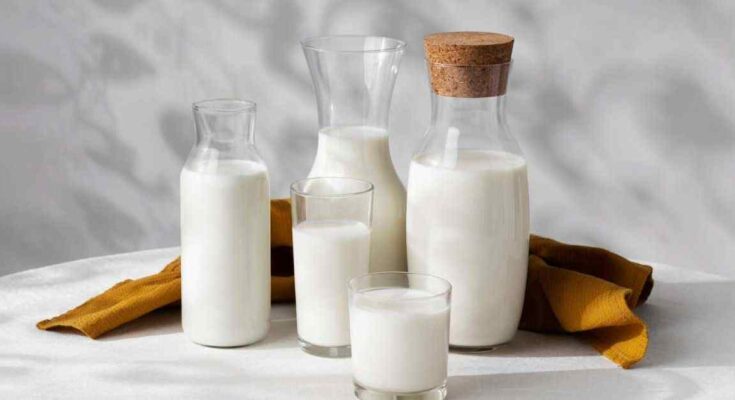Introduction
Overview of Buffalo Milk
Buffalo milk, derived from water buffaloes, is a staple in many parts of the world, particularly in South Asia, Southeast Asia, and Italy. Known for its rich, creamy texture and slightly sweet taste, buffalo milk is a popular alternative to cow’s milk and is used extensively in various culinary applications.
Historical Significance
Buffalo milk has been consumed for centuries. In ancient civilizations, it was prized for its nutritional value and was a staple in the diet of many cultures. In India and Pakistan, for example, buffalo milk has been a dietary cornerstone for millennia, used in everything from everyday beverages to traditional sweets and yogurt.
Relevance and Importance Today
Today, buffalo milk continues to be an essential part of diets in many countries. Its unique nutritional profile makes it a valuable addition to modern diets, especially for those seeking alternatives to cow’s milk due to allergies, dietary preferences, or nutritional needs. Buffalo milk’s versatility in cooking and its health benefits make it increasingly popular in global markets.
Nutritional Profile of Buffalo Milk
Macronutrient Composition
Proteins
Buffalo milk is rich in protein, providing a substantial amount of all essential amino acids. This high protein content makes it an excellent choice for muscle repair and growth, particularly for athletes and individuals with high physical activity levels.
Fats
One of the distinguishing features of buffalo milk is its high-fat content. This fat is predominantly saturated but includes significant amounts of monounsaturated and polyunsaturated fats. The richness of buffalo milk makes it ideal for producing creamy dairy products like cheese and butter.
Carbohydrates
Buffalo milk contains lactose, a natural sugar that provides energy. The carbohydrate content in buffalo milk is similar to that of cow’s milk, making it a suitable source of quick energy.
Micronutrients
Vitamins
Buffalo milk is a rich source of several vital vitamins, including vitamin A, which is crucial for vision and immune function, and vitamin D, which supports bone health by aiding calcium absorption.
Minerals
Minerals such as calcium, magnesium, and phosphorus are abundantly found in buffalo milk. These minerals are essential for maintaining healthy bones and teeth, muscle function, and various metabolic processes.
Comparison with Cow’s Milk
When compared to cow’s milk, buffalo milk is higher in both fat and protein. It also contains more calories and has a richer taste, which makes it preferred for making dairy products like mozzarella cheese. Additionally, buffalo milk has a higher concentration of vitamins and minerals, enhancing its nutritional value.
Health Benefits of Buffalo Milk
Rich Source of Protein
The high protein content in buffalo milk supports muscle growth and repair, making it an excellent addition to the diets of bodybuilders, athletes, and anyone needing a protein boost. Proteins are the building blocks of the body, essential for maintaining healthy tissues, enzymes, and hormones.
High Fat Content and Its Benefits
Despite the high saturated fat content, buffalo milk also provides essential fatty acids that are beneficial for health. These fats help in the absorption of fat-soluble vitamins and provide a concentrated source of energy. Consuming buffalo milk can contribute to healthier skin and hair, thanks to these fats.
Essential Vitamins and Minerals
Buffalo milk’s impressive array of vitamins and minerals supports overall health. Vitamin A enhances vision and immune function, while vitamin D plays a crucial role in bone health. The mineral content, including calcium and phosphorus, is vital for maintaining strong bones and teeth.
Boosts Immune System
The immunoglobulins and bioactive compounds in buffalo milk help boost the immune system. Regular consumption can help enhance the body’s ability to fight infections and diseases, making it an excellent choice for overall health maintenance.
Enhances Bone Health
The high calcium and phosphorus content in buffalo milk is essential for bone health. Regular consumption can help prevent bone disorders such as osteoporosis, making it particularly beneficial for children, the elderly, and individuals at risk of bone density loss.
Improves Cardiovascular Health
While high in fat, the fat profile of buffalo milk includes beneficial fatty acids that can help improve heart health. Moderate consumption can contribute to maintaining healthy cholesterol levels and reducing the risk of cardiovascular diseases.
Benefits for Skin and Hair
Buffalo milk’s rich nutrient profile, including vitamins A and E and healthy fats, makes it beneficial for skin and hair health. These nutrients help in maintaining skin elasticity, reducing dryness, and promoting hair strength and shine.
Promotes Digestive Health
Buffalo milk contains compounds that can aid digestion. It is also known to have a slightly lower lactose content than cow’s milk, which can make it easier to digest for some individuals. The presence of probiotics in buffalo yogurt further enhances digestive health.
Types and Forms of Buffalo Milk Products
Fresh Buffalo Milk
Fresh buffalo milk is enjoyed for its rich, creamy taste and high nutritional value. It is often consumed directly or used in cooking and baking for its superior flavor and texture.
Buffalo Milk Cheese
Buffalo milk is famous for producing high-quality cheeses, especially mozzarella. The higher fat content gives the cheese a distinctively rich flavor and creamy texture, making it a favorite in Italian cuisine and beyond.
Buffalo Milk Yogurt
Yogurt made from buffalo milk is thicker and creamier than that made from cow’s milk. It is rich in probiotics, which are beneficial for gut health, and provides a satisfying, nutrient-dense snack or meal.
Buffalo Milk Butter
Buffalo milk butter is richer and creamier compared to cow’s milk butter. It has a higher fat content, making it ideal for baking and cooking, adding a luxurious texture and flavor to dishes.
Buffalo Milk Ghee
Ghee, or clarified butter made from buffalo milk, is a staple in many South Asian cuisines. It has a high smoke point and is rich in healthy fats, making it ideal for cooking and adding flavor to dishes.
Cultural and Culinary Uses
Traditional Dishes Using Buffalo Milk
Buffalo milk is a key ingredient in many traditional dishes. In India, it is used to make sweets like rasgulla and gulab jamun, as well as savory dishes like paneer (fresh cheese) and kheer (a rice pudding).
Regional Variations
Different regions have their own unique ways of using buffalo milk. In Italy, it is primarily used to make mozzarella di bufala, a prized variety of mozzarella cheese. In South Asia, it is used in a variety of dairy products and traditional recipes.
Modern Culinary Innovations
Buffalo milk is increasingly being used in modern culinary applications. Chefs around the world are experimenting with buffalo milk to create new recipes, from gourmet ice creams to innovative cheese blends.
Environmental and Ethical Considerations
Sustainability of Buffalo Farming
Buffalo farming can be more sustainable than cow farming in certain regions due to the buffalo’s ability to thrive on less fertile lands and its lower environmental impact. Sustainable practices in buffalo farming are essential for minimizing the ecological footprint.
Ethical Practices in Buffalo Milk Production
Ethical considerations in buffalo milk production include humane treatment of the animals, ensuring they are well-fed and cared for, and maintaining clean and safe milking conditions. Ethical farming practices ensure the health of the buffaloes and the quality of the milk produced.
Comparative Analysis
Buffalo Milk vs. Cow Milk
Buffalo milk has higher fat, protein, and calorie content than cow’s milk. It also has a richer taste and is often preferred for making dairy products like cheese and butter. Nutritionally, buffalo milk offers more vitamins and minerals compared to cow’s milk.
Buffalo Milk vs. Goat Milk
Goat milk is often considered easier to digest and lower in fat than buffalo milk. However, buffalo milk offers a creamier texture and higher nutrient density, making it preferable for certain culinary uses and nutritional needs.
Buffalo Milk vs. Plant-Based Milks
Plant-based milks, such as almond or soy milk, are often chosen for dietary restrictions or ethical reasons. While lower in fat and protein compared to buffalo milk, they are suitable for those with lactose intolerance or vegan diets. Buffalo milk, however, provides a more complete nutritional profile for those who can consume animal products.
Potential Drawbacks and Considerations
Lactose Intolerance
While buffalo milk may be slightly easier to digest than cow’s milk for some individuals, it still contains lactose and can cause issues for those with lactose intolerance. Lactose-free options or smaller quantities may be considered.
High Caloric Content
The high fat and calorie content of buffalo milk can be a drawback for those watching their calorie intake or trying to manage weight. It is essential to consume it in moderation to avoid excessive calorie consumption.
Allergies
As with any dairy product, buffalo milk can cause allergic reactions in some individuals. Those with dairy allergies should avoid buffalo milk and opt for alternative options.
Expert Insights
Nutritionist Opinions
Nutritionists often highlight the benefits of buffalo milk’s high protein and nutrient content, particularly for muscle growth and overall health. They recommend it as a part of a balanced diet, especially for individuals needing more calories and nutrients.
Health Professional Recommendations
Health professionals suggest incorporating buffalo milk into the diet for its bone health benefits and immune-boosting properties. However, they advise moderation due to its high fat content and potential lactose issues.
Frequently Asked Questions (FAQs)
Is Buffalo Milk Safe for Everyone?
Buffalo milk is safe for most people but may cause issues for those with lactose intolerance or dairy allergies. It’s best to consult a healthcare provider if you have concerns.
How Does Buffalo Milk Taste?
Buffalo milk has a rich, creamy texture and a slightly sweet taste, making it distinct from cow’s milk.
Can Buffalo Milk Help with Weight Gain?
Yes, the high protein and calorie content in buffalo milk can aid in healthy weight gain when consumed as part of a balanced diet.
Is Buffalo Milk Better for Cooking?
Buffalo milk’s higher fat content makes it excellent for cooking, especially for making rich, creamy dishes and dairy products like cheese and butter.
Where Can I Buy Buffalo Milk?
Buffalo milk can be purchased at specialty grocery stores, health food stores, and online retailers. Availability may vary by region.
How Should Buffalo Milk Be Stored?
Buffalo milk should be stored in the refrigerator and consumed before the expiration date. It can also be frozen for longer storage.
Are There Any Side Effects of Drinking Buffalo Milk?
Some individuals may experience lactose intolerance symptoms or allergic reactions. It is important to monitor your body’s response and consult a healthcare provider if necessary.
How Does Buffalo Milk Support Bone Health?
Buffalo milk is rich in calcium and phosphorus, essential minerals for maintaining strong bones and preventing osteoporosis.
Can Buffalo Milk Improve Skin Conditions?
The vitamins and fats in buffalo milk can contribute to healthier skin, potentially reducing dryness and improving elasticity.
Is Buffalo Milk Good for Children?
Buffalo milk is nutritious and can be beneficial for children’s growth and development. However, it should be introduced after consulting with a pediatrician, especially if there are concerns about allergies or lactose intolerance.
Conclusion
Summary of Key Points
Buffalo milk offers numerous health benefits, including high protein content, essential vitamins and minerals, and immune-boosting properties. Its rich, creamy texture makes it a versatile ingredient in various culinary applications. While it has higher fat and calorie content than cow’s milk, its nutritional advantages make it a valuable addition to many diets.
Final Thoughts and Recommendations
Incorporating buffalo milk into your diet can provide significant health benefits, particularly for those needing more calories, protein, and nutrients. As with any food, moderation is key. For those with lactose intolerance or dairy allergies, alternative options should be considered. Consulting with a healthcare provider can help determine the best dietary choices for your individual needs.




